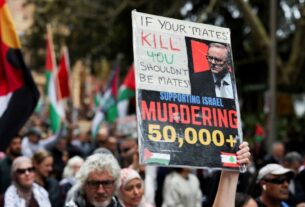Jerusalem – In a rare and alarming breach of Israel’s much-acclaimed missile defense systems, a drone reportedly launched by Yemen’s Iran-aligned Houthi fighters struck the southern Israeli city of Eilat on Wednesday. The attack injured 22 people, some of them severely, according to emergency medical services.
Magen David Adom, Israel’s national rescue service, confirmed that two of the injured sustained severe shrapnel wounds to their limbs and were rushed to nearby hospitals for urgent treatment.
The Ansarallah movement (commonly known as the Houthis) claimed responsibility for the attack, saying they had launched two drones toward Israel in support of the Palestinian cause. While most Houthi-fired drones and missiles are typically intercepted or land harmlessly, this breach marks one of the few times such an attack has inflicted multiple injuries.
Following the strike, Israeli Defence Minister Israel Katz issued a stern warning on X (formerly Twitter):
“Anyone who harms Israel will be harmed sevenfold.”
The Israeli military acknowledged it attempted to intercept the drone but did not elaborate on why the system failed this time.
Simultaneous Bloodshed in Gaza
While southern Israel reeled from the drone strike, Gaza experienced yet another tragic day.
According to medical sources, at least 41 Palestinians were killed in Israeli airstrikes.
One of the deadliest attacks occurred in Gaza City, where a strike hit tents sheltering displaced families. Dr. Fadel Naim, director of Al-Ahli Hospital, confirmed that 22 people, including three children and nine women, were killed.
The Israeli military said the strike targeted two Hamas militants using “precise munitions” and claimed efforts were made to minimize civilian harm. However, local hospitals and humanitarian workers reported high civilian casualties.
In central Gaza’s Nuseirat refugee camp, another airstrike claimed 12 lives, with 18 more injured, according to Al-Awda Hospital. Among the victims were two children and their parents, whose home was directly hit.
Elsewhere in southern Gaza, Nasser Hospital reported that three civilians were shot while seeking humanitarian aid—another tragic instance in what human rights groups describe as a pattern of lethal force against those searching for food and water.
West Bank and Broader Conflict
In the occupied West Bank, a 24-year-old Palestinian man was shot and killed near Jenin. Israeli forces said he had thrown an explosive device.
These escalating events unfolded just as the UN General Assembly convened to address the ongoing Middle East crisis.
At separate side events, U.S. Secretary of State Marco Rubio and Trump’s Middle East envoy Steve Witkoff promoted what they called a “21-point plan for peace.” They claimed progress was being made behind the scenes with key Arab leaders. Egyptian President Abdel-Fattah el-Sissi also voiced cautious optimism, calling the proposal an “important foundation” for future peace.
Meanwhile, diplomatic efforts led by the U.S., Egypt, and Qatar to reach a Gaza ceasefire and secure hostage releases have faced repeated setbacks. Earlier this month, those talks were severely impacted by an Israeli strike targeting Hamas leaders inside Qatar.
Gaza’s Humanitarian Crisis Deepens
The war began after Hamas-led militants stormed into Israel on October 7, 2023, killing around 1,200 people and capturing 251 hostages. Today, 48 captives remain, with Israel believing about 20 are still alive.
Israel’s ongoing military campaign in response has left Gaza devastated. The Gaza Health Ministry reports that over 65,000 people have been killed. Although the ministry does not distinguish between civilians and fighters, it estimates that women and children make up nearly half of the casualties.
Famine conditions are worsening in Gaza City, where a fresh Israeli ground offensive is displacing hundreds of thousands. Over 300,000 people have fled in recent weeks, yet as many as 700,000 remain trapped, many unable to relocate due to poverty or lack of safe passage.
A Moment to Reflect: Beyond Headlines and Borders
Beneath the political rhetoric and military strategies lies an undeniable human tragedy. Whether it’s a child in Gaza losing their parents or a civilian in Eilat wounded by shrapnel, lives are being shattered.
This isn’t just a war of weapons—it’s a war on humanity.
As we watch events unfold, we must remember that each statistic is a person, with dreams, fears, and a right to live in peace. Political solutions may take time, but empathy and awareness are the bridges that must be built now.
Let’s not allow our hearts to become numb. Let’s keep asking difficult questions, demanding accountability, and holding onto compassion—even when the world feels divided.




